
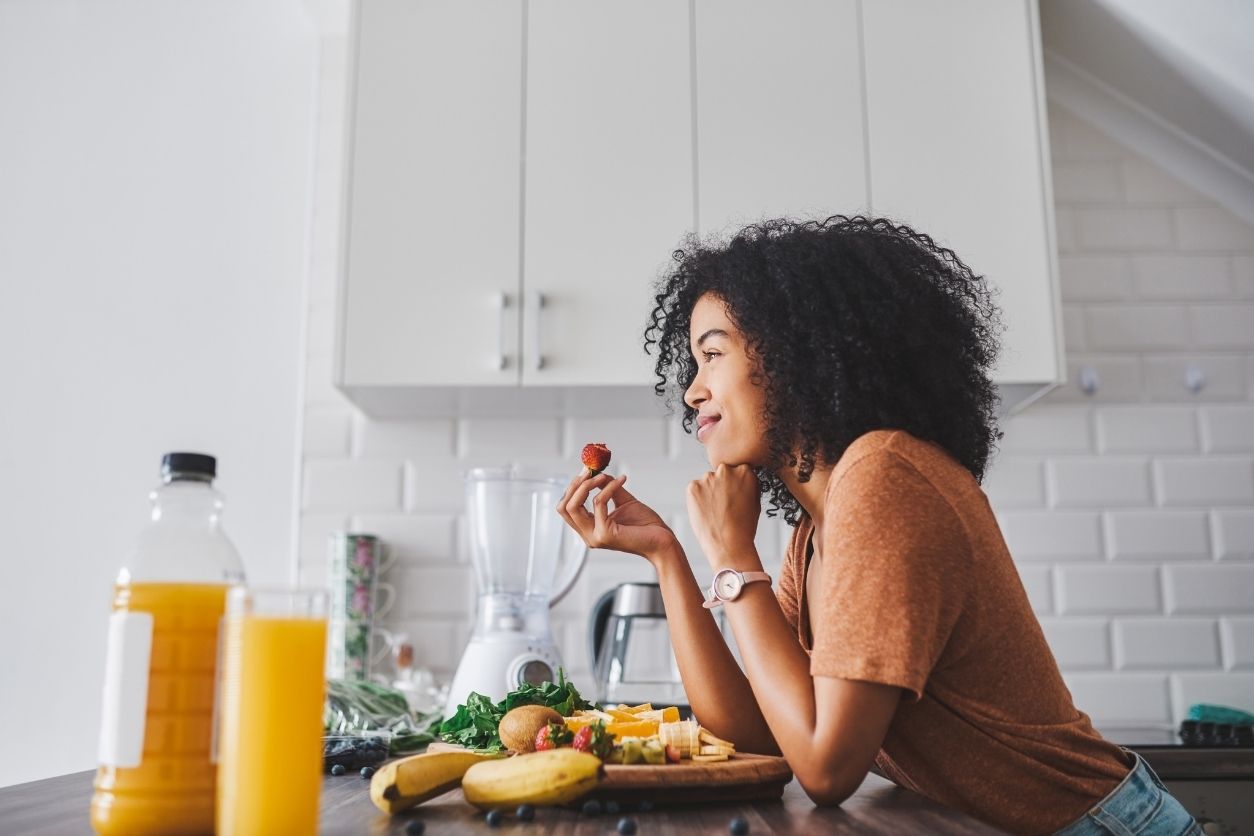
Curious about intuitive eating for weight loss? Learn why it’s a weight-neutral approach that supports body trust, not body shrinking.

I often hear from clients, “I want to eat to feel healthier”. Followed by, “I don’t want to go on another diet, I’m tired of nothing working”. And the tag-a-long sentiment behind these statements? “ I want to lose weight the right way”.
These are such relatable sentiments.
The diet industry is alive and well and making A LOT of money off of us failing. Don’t be fooled by buzz words that replace “diet” such as “ lifestyle” or ‘clean eating”. It all is saying the same thing- buy into this (literally! Buy our product)! And when you fail, you spend more and more money trying to fix it.
Anytime we are listening to an external source (who’s never met you and knows nothing about you) about what, when and how much you should and shouldn’t be eating, we’re at risk of disconnecting with our body. E.g. subscribing to the old adage of not eating after supper, yet your stomach is growling with hunger.
We shame ourselves for being hungry and fail to take into account how much activity we did that day, how much brain power we used, whether we ate regularly in the day and whether our food choices were reasonably balanced. That growl is your body’s way of accounting for all of those things! To ignore that because “I can’t eat before bed” is denying your body’s very efficient signal for nourishment.
We live in a culture that rewards certain body types over others and a healthcare system that uses misguided measures such as weight and BMI to determine overall health and disease risk. It’s overwhelming when the message received is that the onus is on YOU to achieve the body size that fits societal standards. So what happens when we can’t seem to figure it out? When the utopia of sustainably staying in a smaller body is forever out of reach? When the endless bouts of food restriction in some way, shape or form seems to make everything worse? When we feel frustrated and like we are failing- ALL the time?
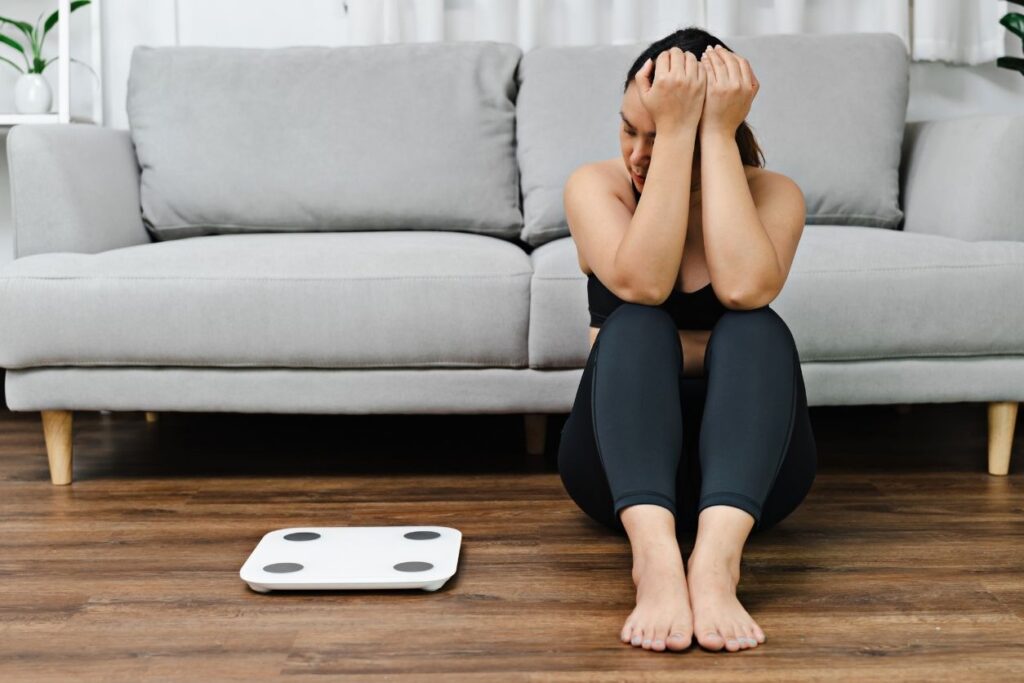
You may have heard of an approach called Intuitive Eating. Maybe, just maybe, now is the time to find out what it’s all about!
The Intuitive Eating model has been around for over 25 years. The authors behind it (2 dietitians, none the less!) Evelyn Tribole and Elyse Resch are currently on their fourth revised and updated edition of their best-selling book Intuitive Eating: An Anti-Diet Approach (talk about life-long learners!). Yet, Intuitive Eating is a hot topic now more than ever.
Pinpointing exactly what it means to be an intuitive eater can be tricky. Trust me, I’ve come across many approaches claiming to be aligned with the core values of intuitive eating that frankly, just aren’t. So what really is Intuitive Eating? Here we take a closer look at why it just might be worth the work to do this “inside job” to heal your relationship with food and body.
Intuitive eating is a weight-neutral alternative to eating. It is anchored in learning how to nourish ourselves in a way that honors our bodies. Evelyn Tribole put it best:
“Intuitive eating is a mind and body framework that helps you connect and eat in a way that’s enjoyable”.
Each Intuitive Eating principle requires careful consideration to determine how it shows up in our eating and thought patterns as well as practice and patience to achieve overall food freedom. The 10 principles of intuitive eating are:
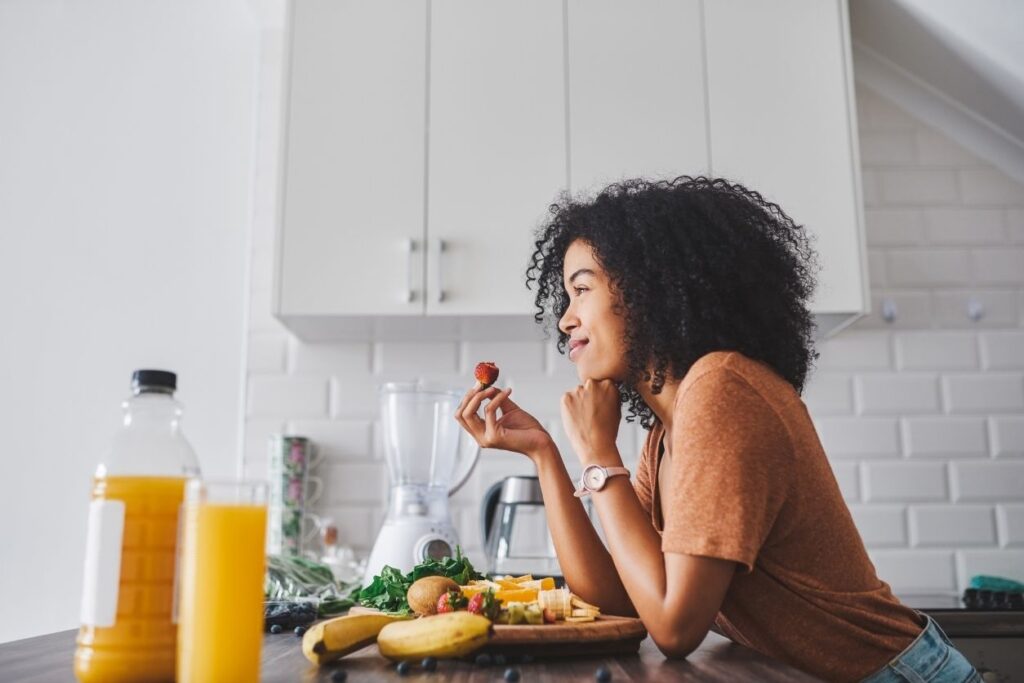
In order to learn how to listen to our body, we have to stop buying into a multi-billion-dollar diet industry that finds success in our “failure” to stick to unsustainable standards.
Means tuning into when your body requires fuel. How often do you push off eating despite a grumbling stomach, tanking energy levels and a dipping mood until you finish the next task, and the next and the next? Did you know this can lead to ravenous hunger later on, not to mention intense cravings for low fibre, higher sugar foods? That’s your body’s way of replenishing what was missed earlier on (eg. blood sugar levels).
Instead of labeling food “bad” or “good”, enjoy it for what it is- no foods are off the table, only the guilt and shame spiral that can follow.
There are so many influences that affect the way we eat. Whether it’s social media, billboards on the side of the road or your own family and friends- it can be difficult to ignore the unending judgements on food and what you ‘should’ and ‘shouldn’t’ eat.
Enjoying food is one of the greatest pleasures of life. Sharing a meal out with friends, cooking with a loved one, eating a holiday classic with family, enjoying your favorite snack cuddled alone on the couch- these are the joys of eating, and we should revel in it.
There are lots of reasons we can eat past comfortable fullness- being too hungry when we start eating is one of them. It can also be due to guilt and shame for eating that food in the first place. Practicing this mantra from Evelyn Tribole, “ I can have this again whenever I want” can be helpful in listening to our cues for fullness. There is freedom in stopping when satisfied with the knowledge that that food it is not restricted and their will be opportunity to eat it again- maybe even when you warm it up for leftovers at the next meal!
Whatever emotion we are experiencing, it’s okay. Finding the strategies that work for you when experiencing challenging emotions can be incredibly helpful. Eating can be a short cut from fight or flight into rest and digest. It’s okay to occasionally eat for comfort, however, having lots of self-care tools in our kit can help us through.
Our genetics play an incredible role in determining our body features. Body diversity means that there are many body shapes, sizes and distinguishing features. Instead of controlling our body, accepting it is an integral step in rejecting diet mentality.
Finding physical activity that you enjoy doing can be the difference between quitting something shortly after starting and finding consistency over time. Notice how your body feels during the activity- does it motivate you, entertain you, feel good, increase energy? Or are you focused solely on how many calories it will burn?
Nutrient adequacy is not determined in one meal, day or even week. Make food choices that honor your culture, your preferences and the way it makes you feel. Perfection in our food choices is not only unrealistic, it can be problematic. If you’re navigating body changes in perimenopause, this gentle guide on supporting your nutrition may help: Top Nutrients for Perimenopause.

There can be some understandable confusion between approaches that seem like-minded and similar to intuitive eating. Understanding the differences in each approach can be helpful. Let’s take a look at mindful eating and flexible dieting as compared to intuitive eating.
While mindful eating hones in on the eating experience itself including an increased awareness of the sensory experience while eating, Intuitive Eating goes beyond mealtime. It is a mindset and blueprint for a way of living that focuses on improved health through healing one’s relationship with food and their body. While mindful eating is a practice that is woven into many approaches, Intuitive eating is a specific guide to achieving this.
The flexible diet approach aims at reducing restriction in food choices, but is structured around meeting specific macronutrient needs. Intuitive Eating does not tell you what to eat or when. It does not outline how much you should eat or count calories or macronutrients. It does not ask you to follow a meal plan, reduce or cut out certain food groups or increase intake of any one thing. As mentioned before, Intuitive eating is an inside job. It requires work and practice to turn inward for important food cues from our bodies. All of the above listed items are external, and require us to disconnect with our body to carry out the direction of a rule placed on us from an outside source.

For some, weight loss may be the result of learning to eat in a way that feels good for their body. Others may find their body weight stays the same or increases, particularly in the case where someone is nourishing themselves for the first time after many years of restrictive dieting.
Using intuitive eating to achieve intentional weight loss would require us to manipulate our food intake in order to shrink ourselves. This cannot exist at the same time that we are authentically doing the work to connect with and be at peace with our body. Therefore, weight loss cannot be a goal of intuitive eating.
It can be really scary to think about turning inward for information, especially when the diet industry has told us they have the answers, ‘listen to us’!
You might be asking yourself:
Learning to trust our body is a huge shift and can take some time to adjust to. Each principle takes practice because we are essentially working to rewire our brain while challenging cultural norms. But the payoff is worth it.
When we are nourishing ourselves- eating the right amount for our body, not living in a state of hunger and allowing all foods without guilt or shame, the reverse of what we fear might happen, does.
Studies show that Intuitive Eating leads to increased weight stability and decreased weight cycling- a massive predictor of overall health. Weight cycling is when weight loss occurs due to manipulating food intake in some way- overall calorie intake, cutting out certain food groups, macronutrients or when you eat. Our body senses this and reacts (a survival mechanism) by driving up hunger cues and food cravings, while slowing down the GI tract and the rate the body burns energy. The result is weight gain, often past the starting weight.
Intuitive Eating reduces the instance of binge eating due to the lack of restriction causing intense hormonal drives to eat. It leads to improved biomarkers due to things such as consistent physical activity over time and a balanced and varied diet that results from eating to fullness and listening to the body’s needs. In short- your body’s natural drive was never for ice cream all day and it won’t be now. That drive was always from the labeling, restricting and guilt placed on the ice cream for ever choosing to eat it in the first place.
Neurodivergent individuals can sometimes make it more difficult to read hunger cues and may benefit from gentle structure. Check out this meal planning guide with ADHD for helpful suggestions.
If intuitive eating is steeped in learning to trust ourselves, be gentle with and heal our body- it’s hard to argue against it. To be at war with our body, year over year, decade over decade is not only crushing and exhausting, it’s also harmful.
Those who embark on a journey to intuitive eating report improved energy, mental wellness and satisfaction in body and food choices. It has also been shown to improve health markers such as GI symptoms, blood glucose levels and blood pressure and reduce the incidence of disordered eating and eating disorder behavior.
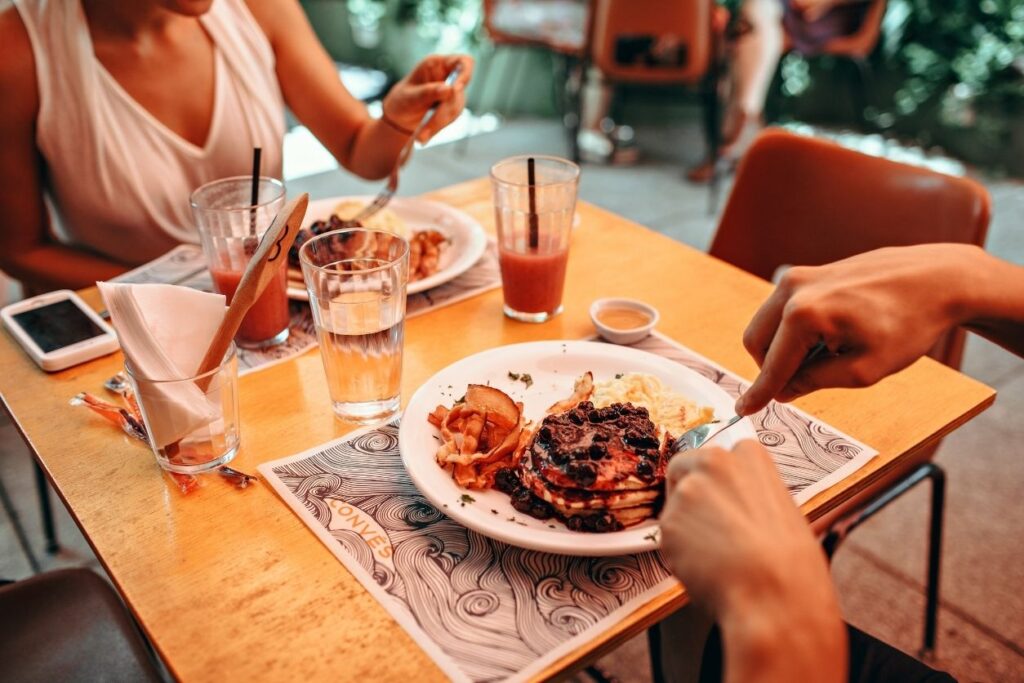
In turning away from diet culture and instead moving inward to the practice of becoming an intuitive eater, there can be just as much “unlearning” of old adages as learning of a new approach. And that’s not always easy. Unhelpful ways of thinking that can be so ingrained in us that we don’t even realize we are thinking that way. I often hear people agreeing about avoiding food labels and making peace with food, who in the next sentence say they know that a certain food is ‘bad’ for them and they shouldn’t eat it.
Intuitive eating can be hard for many different reasons, a few of which are when you:
It takes time to build trust in any relationship, including the one you have with your body. Practicing body attunement without judgment of the result along the way is the first step to healing your relationship with food and body.
Weight loss is not the goal of intuitive eating. That said, some people may lose weight as a side effect of eating in a way that supports their body’s needs. Others may gain or maintain their weight. The key is that intuitive eating helps you build a peaceful, connected relationship with food without trying to control your body size.
Yes, intuitive eating can absolutely support chronic condition management. It emphasizes body attunement, gentle nutrition, and consistent eating, which can improve markers like blood pressure, cholesterol, and blood sugar. A dietitian can help tailor this approach to your individual needs.
Nope. That urge often comes from past restriction. When all foods are allowed and guilt is removed, your body begins to crave a balance of foods that truly satisfy, including nutrient-dense ones. Intuitive eating is about listening, not indulging every whim.
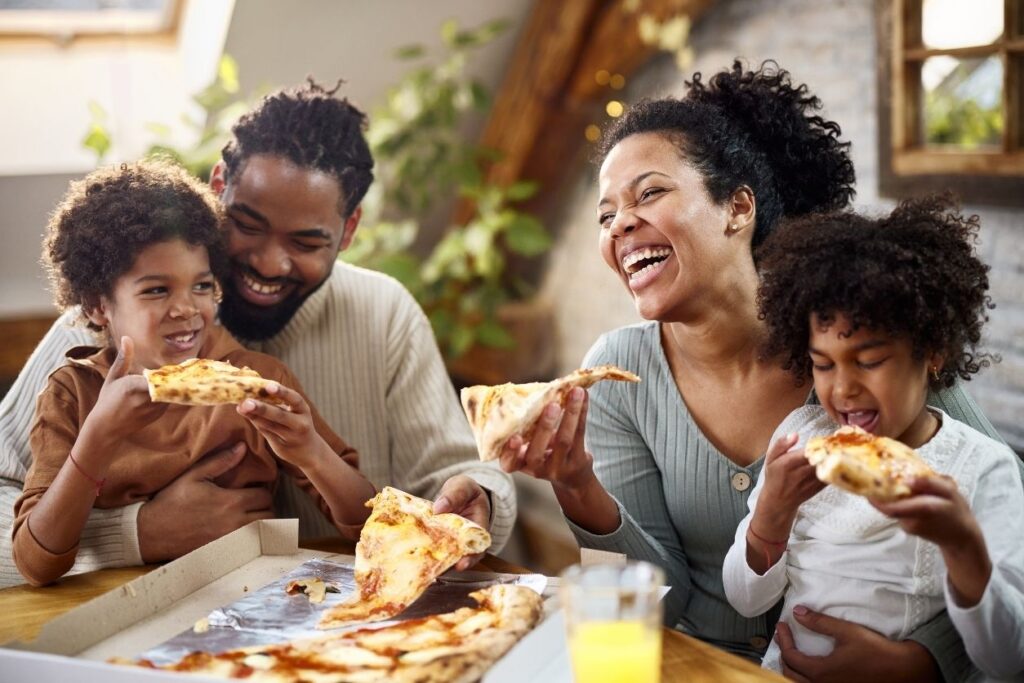
Intuitive eating ultimately isn’t about control; it’s about connection. It’s learning to trust our body to give us information about what it needs: nourishment, movement, self-care, and more. Healing our relationship with food and our body means freedom and space to give energy to other important areas of our lives. Ask yourself, “What is the story of my body? What needs healing, and what would it be like to trust it again?”
At Centred Nutrition Collective, our team of dietitians are experts in intuitive eating and helping clients build trust in their bodies. If you’d like to explore the strategies and practices that support this approach, we’d love to guide you. Book a one-on-one session with our team today and start your journey toward a more peaceful relationship with food.
